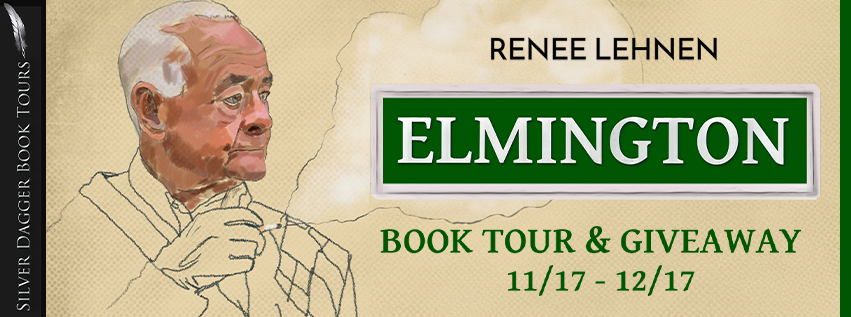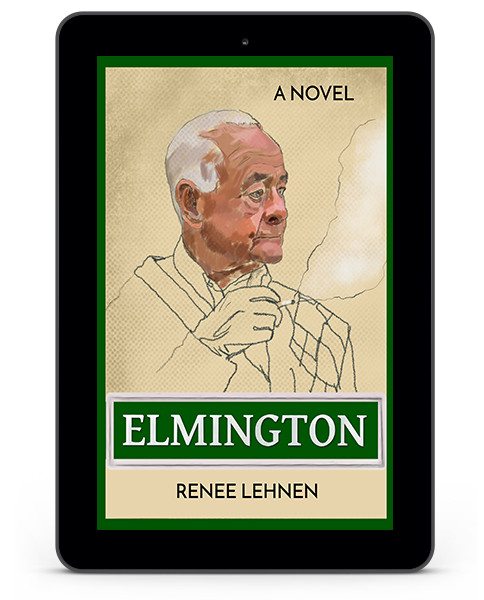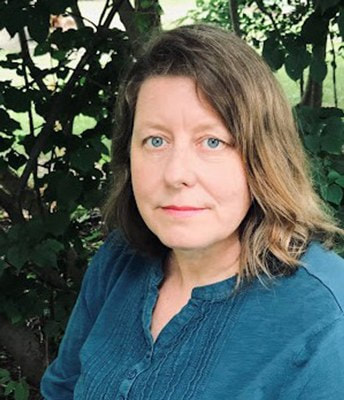No good deed goes unpunished in a willfully blind, technocratic society ➱ Elmington Social Satirical Fiction by Renee Lehnen Book Tour with Guest Post and giveaway
No good deed goes unpunished in a willfully blind, technocratic society.
Elmington
by Renee Lehnen
Genre: Social Satirical Fiction
No
good deed goes unpunished in a willfully blind, technocratic
society.
Gordon
Gray, a retired librarian, only wishes to chain smoke, read
twentieth-century novels by dead white men, and at the time of his
choosing, shuffle off his mortal coil. Everyone from his
thanatophobic doctor to his New Age neighbour has an opinion on what
Gordon should want and how he should be treated. When his daughter
Martha arrives from the West Coast, she finds Gordon disheveled,
wheezy, and cantankerous in his squalid bungalow. She remains in
Elmington to negotiate with his meddlesome entourage and look after
him. Seven months later, Gordon is dead, and Martha is in police
custody for the crime of caring unconventionally.
Winner
of the Crime Writers of Canada Award of Excellence for Best
Unpublished Manuscript in 2022
“Very
engaging, great dialogue, great dark humour and social commentary.”
– Crime Writers of Canada Judges
"The central
characters in Elmington crackle with complexity and conflicted
feelings as they navigate the minefield of end-of-life decision
making. As Renee Lehnen’s pitch perfect prose animates the
fictional town, the tensions simmering just below its gleaming
surface emerge. This timely and unforgettable book confronts the most
difficult choices a family can be asked to make - and the constraints
within which those decisions are forced to unfold.” — Judith
Harway, author of the memoir Sundown and
three collections of poetry
Amazon * Apple * B&N * Kobo * Smashwords * Books2Read * Bookbub * Goodreads
Excerpt from Elmington
by Renee Lehnen
Published by
Storeylines Press, 2023
“Open the drapes,
Duchess,” Gordon squawked. “See what’s become of your old neighbourhood.”
Martha went to the
bay window, pulled the heavy, burgundy curtains across the rod, and squinted
into sunshine. When she’d arrived by taxi in the night, the haze of
streetlights only vaguely outlined the houses on Roselea Drive. She could see
alright now. Across the street stood Falstaff in a Zen garden—a half-timbered
Jolly Olde English cottage on steroids surrounded by geometric topiary.
“Who lives there,
Dad?” asked Martha, pointing.
“Bean counter,”
Gordon wheezed. “A modern-day Bob Cratchit who toils over ledgers for one of
the Bay Street banks.”
“Do you know his
name?”
“Nope.”
“I’ll bet he can
afford a Christmas turkey.”
“Sure,” agreed
Gordon. “But he probably prefers a thistle salad. His soul is harder than a
dried pea. I’ve only spoken to him once, while he was orchestrating the
disgorgement of his belongings from a moving van into that, that… house… and I
knew by the way he treated the box carriers that there was no point in pursuing
neighbourly friendship.” Gordon waved a liver-spotted hand dismissively, then
coughed.
“How about them?”
Martha gestured toward the grand Cape Cod style house on their right.
“An advertising exec
and his social x-ray wife. Rest in peace, Tom Wolfe. . . .”
“Nice house.”
“Yup. I imagine the
happy couple inside it, drinking martinis and mending nets by the hurricane
lamp.”
“Are there any kids
in the neighbourhood now?”
“A few, though you
never see them. They’re ferried about by SUV, school to sports to elocution
classes or whatever kids get up to these days. There’s a boy next door, on the
left.”
“Do you know his
name?”
“Ethan. Like the
furniture.”
Martha smiled. Of
course, the old man remembered the boy’s name.
“Poor kid will never
have a paper route, or play ball hockey, or soap windows on Halloween,” wheezed
Gordon. “His mother, Joanne, keeps him on a strict schedule. He’s fourteen, for
crying out loud.”
“Who’s crying out
loud?”
“I am. On the lad’s
behalf. By the way, how’s Joseph?”
“Still
incommunicado,” replied Martha, voice faintly forlorn. “His community doesn’t
believe in using modern technology—you know, like telephones—and it’s peach
season in the Okanagan, so I guess he’s too busy to write or get in touch.”
“His community or his
cult?”
“Take your pick.”
Her answer hung in
the air while the old man hacked and spat into a Kleenex. She peered through
the slanted glass at the home of poor Ethan. The house was reclad in pastel
angel stone and stucco and a shiny, black Lincoln Navigator sat on equally
black, freshly sealed asphalt.
Her gaze shifted to
her father’s front yard. The Corolla had come to rest at an odd angle on the
crumbling driveway. No doubt the old man had become a menace to pedestrians,
cyclists, and other motorists on the broad streets of Elmington. Since her
mother’s death three years prior, weeds had invaded the flower borders and now
lamb’s quarter and wild carrot grew among the roses and hostas. The lawn was
almost knee-high.
“I’ll mow today,”
said Martha.
“You’ll do no such
thing,” Gordon countered. “I hired a company to do it. It’s been a wet summer.
They’re just behind. Now I’ll thank you for straightening the drapes and
bringing me coffee.”
“Okay. Coffee.”
Martha crossed the
shag carpet, passed through a short hallway, and entered the kitchen. The
linoleum was sticky under foot. Twin dog bowls, one with dusty kibble, the
other empty, graced the corner, although her mother’s Pekinese, “Mutsu,” had
died several months prior. On the counter, dirty spoons and glasses and cups
ringed by evaporating liquids awaited a dishwasher who hadn’t come. Until now.
This was the first chore she’d tackle. . . .
While Martha waited
for the water to boil, she looked through the window over the sink. The kitchen
faced northwest, in shadow for much of the day. However, it wasn’t the dimness
of the room she found depressing, but the absence of three graceful spruces
that used to mark the property line behind the house. Now a tall, wooden fence,
ugly side out, guarded the lot to the rear and a new monster home dwarfed the
bungalow.
She leaned against
the counter and considered the old man’s circumstances. He was slipping from
chronic ill health into advanced decrepitude. Following a weekend conference in
Toronto, she’d intended to stay in Elmington for a few days, then fly back to Vancouver
for the beginning of the fall term. Plainly that would be impossible. The old
man had to be sorted out. At the very least, he needed home care. Better yet, a
move to a nursing home, but he’d never agree to that.
The kettle whistled.
Martha poured boiling water into the mugs and stirred. The milk in the fridge
was curdled sludge. They’d have to drink their coffee black this morning,
bracing and hot. She carried the mugs to the living room and set her father’s
mug on a tray table piled with books, next to his recliner.
For the first time
that morning, he smiled at Martha, revealing a row of yellow teeth that
resembled broken doweling. “Thank you, Duchess.”
As a young, socialist
firebrand, she’d hated that nickname. Now she didn’t mind it. “You’re welcome,
Dad,” replied Martha, returning his smile.
Can you, for those who don't know
you already, tell something about yourself and how you became an author?
I’m a frontline registered
nurse. RNs usually keep their opinions to themselves in this sensitive,
censorious day and age. I became an author because I thought my ideas were
worth sharing.
I started with essays but they
were earnest, preachy bores and took themselves too seriously so I banished them to a dull cocktail party in my
laptop. I switched to fiction writing, first short stories, then novels.
Fiction offers more scope for getting one’s point across without anaesthetizing
readers with tedium.
What is something unique/quirky about you?
I’m addicted to podcasts on real estate and self-made
billionaires.
Tell us something really interesting that's happened to
you!
“Happened to (me)!” – the phrase suggests passivity on my
part, with an exclamation mark no less. Hmm. Once, in a ski lift line, I was
with my daughter who was wearing old, secondhand ski goggles and a man who
worked for a major sporting goods company saw the goggles and offered to trade
them for brand-new, top-of-the-line goggles. We took him up on his offer,
though I wonder if we couldn’t have bargained for more.
What are some of your pet peeves?
I dislike bureaucratic decision making and being told what
to do.
Where were you born/grew up at?
I was born in Kitchener, Ontario and I grew up in rural
southwestern Ontario.
If you knew you'd die tomorrow, how would you spend your last
day?
I’d spend the day with my husband and my family,
reminisce, and remind them how much I love them. I’m not a crier, but I’d make
an exception on that day.
Who is your hero and why?
I respect courageous free thinkers – people such as the
late Buckminster Fuller, Margaret Atwood, Cornell West, Ricky Gervais – folks
who defy the pigeon-holes of political identity because they think for
themselves.
What kind of world ruler would you be?
I hope I’d be a benevolent libertarian, but I fear
the power would go to my head.
What are you passionate about these days?
Civil liberties and preserving basic freedoms such as
freedom of speech. I also hope that humans will – very soon – grasp the
sensible notion that we do not have to develop every square inch of Mother
Earth, that we need wild places.
What do you do to unwind and relax?
I enjoy outdoor sports. I’ve been learning to play
the piano, but I’m firmly stuck in the easy, plunketty-plunk songs so while the
piano may be relaxing to me, it can be distressful to those within earshot of
me.
How to find time to write as a parent?
I didn’t write when my children were small. I started
writing when my kids were in high school and they preferred me writing to
helicoptering.
Describe yourself in 5 words or less!
Freakishly tolerant of hard work.
When did you first consider yourself a writer?
Gee, that’s hard, as I don’t feel I’ve broken in enough to
earn the label. The first time my writing passed the “stranger test”, i.e.,
someone other than my mother or husband found my work compelling enough to
bother with, was when an essay I wrote on long-term care was accepted for
publication in Canada’s largest newspaper. I wrote it under a pseudonym to
avoid being fired from my job in a nursing home. That was in 2017. That was
both a breakthrough and a kick forward.
Do you have a favorite movie?
I love any screwball comedy, the more distasteful the
better.
Which of your novels can you imagine made into a movie?
Elmington. It’s bittersweet and written in third person
which is easier for movie adaptation, I think. As my romances are spicy, there
wouldn’t be enough material for even a short movie minus sex scenes. So, yup,
Elmington it is.
What literary pilgrimages have you gone on?
Whenever I travel, I look for literary places, e.g., Emily
Bronte’s English moors, Mordecai Richler’s Saint Urbain Street in Montreal.
Very close to home, I’ve visited the tiny park and library named for Alice
Munro in Wingham, Ontario.
As a writer, what would you choose as your
mascot/avatar/spirit animal?
If beavers had facility in English and waterproof laptops,
maybe a beaver? Hide the pencils!
Renee Lehnen is a registered nurse by profession and a writer by passion. Her short stories have been published in the anthologies "Dark Secrets" and "Murder! Mystery! Mayhem!" In addition, she was the 2019 winner and 2020 runner-up of Stratford Rotary’s short story contest. In 2023, her Victorian romance novel, "What Love Demands", was released by The Wild Rose Press under her pen name, Renata North. Renee lives in Stratford, Ontario with her husband.
Website * Facebook * Twitter * Instagram * Bookbub * Amazon * Goodreads
Follow the tour HERE for special content and a giveaway!
$20 Amazon giftcard – 1 winner,
Print copy of Elmington – 4 winners,
ebook of Elmington - 12 winners!










This story sounds really good. Thanks for sharing.
ReplyDelete